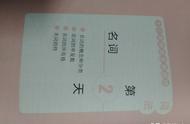
1. appreciatev[不用于进行时] 欣赏;赏识;感激;感谢:
His talents aren’t appreciated by his boss, which makes him depressed.
他的才干不为老板赏识,这使得他很沮丧。
I appreciate your help very much and what you have done means something to me.
非常感谢你的帮助,你所做的对我来说意义非凡。
2. blamev责备;把……归咎于:
You’ve failed to do what you were expected to and I’m afraid the teacher will blame you.
你没做成期望你做的事,我恐怕老师会责备你。
3. conditionn状况;情况:
We were astonished to find the temple still in its original condition.
我们惊奇地发现这座庙宇仍然保存完好。
4. curiousadj好奇的;爱探究的:
He’s such a curious boy, always asking questions.
他是个好奇心很强的孩子,总爱问问题。
5. disturbv打扰;扰乱;使心神不安:
Sorry to disturb you, but can I talk to you for a minute?
抱歉打扰您,我能跟您聊一会儿吗?
6. directionn方向;方位;指导;指挥;管理:
Tom went off in the direction of the post office.
汤姆朝邮局的方向走去。
We did the work under his direction.
我们在他的指导下工作。
7. disastern灾难:
Quite a few people used to believe that disaster was sure to strike if a mirror was broken.
过去曾经有不少人认为如果镜子碎了灾难就会降临。
8. diseasen疾病:
A disease known is half cured.
病情弄清楚,病根除一半。
9. eageradj渴望的;热切的(keen):
His classes were crowded with eager students.
他的课上挤满了求知若渴的学生。
10. familiaradj熟悉的;常见的:
The theme park you are probably most familiar with is Disneyland.
你最熟悉的主题公园大概就是迪士尼乐园。
11. guiltyadj内疚的;惭愧的:
I felt guilty about / at breaking my promise.
我对违背诺言感到内疚。
12. hidev(把……)藏起来;隐藏:
She and her family hid away for nearly twenty-five months before they were discovered.
她和家人躲藏了近25个月后才被发现。
13. hesitatev踌躇;犹豫;顾虑:
He hesitated before he replied.
回答前,他犹豫了一下。
14. influence n影响;v影响:
My physics teacher is my role model, whose influence on me had to do with my decision.
物理老师是我的榜样,他对我的影响与我所作的决定有关系。
Confucius greatly influenced the development of China’s culture and education.
孔子对中国的文化和教育的发展产生了深远的影响。
15. instructionn指示;命令:用法说明:
Read the instructions on medicine thoroughly.
仔细阅读药品说明。
16. judge n[C]法官;裁判员;鉴定人;v判断:
The prisoner was taken before the judge.
犯人被带到法官面前。
Judging from her accent, she must be from Sichuan.
听口音,她准是四川人。
17. knowledgen知识;学问:
The research program broadened students’ knowledge.
该研究课程拓宽了学生的知识面。
18. lackn[U] [常用单数]缺乏;不足:
These children have health problems linked to poor diet and a lack of exercise.
这些孩子有与不良饮食和缺乏运动相关的健康问题。
19. materialn[常用复数]材料;原料:
raw materials原材料
He is a good soldier, but not really officer material.
他是个好士兵,但不太是当军官的料。
20. narrowadj (宽度等)狭窄的; (心胸、视野等)狭隘的/狭窄的:
As we set out, I was shocked at how narrow the path was.
出发后,我吃惊地发现这条小路是多么狭窄!
She has a very narrow view of the world.
她的世界观非常狭隘。
21. object n物体;v反对;不赞成:
What’s that dark object lying in the street?
街道上那个黑乎乎的东西是什么?
We object to leaving him alone.
我们不赞成留下他一个人。
22. particularadj [只用于名词前]特定的特别的;格外的:
He did not show up on that particular day.
他并没有在那一天露面。
We must pay particular attention to this point.
我们必须要特别注意这一点。
23. qualityn [C] & [U]质;质量; [C] [常用复数]品质;品德:
This model is of good / high quality, but it’s too expensive.
这个型号质量好,但太贵。
What qualities does a great person have?
伟人具有什么样的品德?
24. recoverv恢复(意识、知觉等);恢复(健康;常态):
It took her a few minutes to recover consciousness.
过了几分钟她才恢复意识。
With my special care, my mother recovered quickly.
在我的精心照料下,妈妈很快就康复了。
25. remindv提醒:
I forgot to remind him about / of the time for the interview.
我忘了提醒他面试的时间。
26. schedulen日程安排;时刻表:
Thanks to your help, we accomplished the task ahead of schedule.
多亏你们的帮助,我们提前完成了任务。
27. seekv寻找
They sought for a place to shelter from the rain, but in vain.
他们寻找避雨的地方,但没能找到。
28. satisfyv(使)满足;(使)满意:
Nick is looking for another job because he feels that nothing he does satisfies his boss.
尼克正在找新工作,因为他感到老板对他做的工作都不满意。
29. satisfactionn满意;满足;乐事反义词dissatisfaction:
She expressed her satisfaction with / at the result.
她对结果表示满意。
30. situationn处境;形势:
It’s helpful to put children in a situation where they can see themselves differently.
让孩子置身于能让他们看到不一样的自己的局面里,这对他们是有帮助的。
31. toughadj强壮的;坚强的:
Are you sure you’re physically tough enough for this job?
你确定你的身体足够强壮能应付这份工作吗
32. upsetadj[不用于名词前]心烦意乱的;难过的:
She was very upset to hear that the holiday had been cancelled.
听说假期取消了,她感到非常失望。
33. varietyn[U]多样性;变化:
Chinese food is famous for its wide variety.
中餐以菜系多样而闻名。
34. warnv警告;告诫;提醒:
I tried to warn him, but he wouldn’t listen.
我试图警告过他,但他不听。
35. commentn评论:
It is impolite to make unfavorable comments on a person’s appearance.
对他人的外貌作负面评价是不礼貌的。
36. mentaladj[只用于名词前]精神的;心理的;脑力的反义词physical:
It’s important to maintain good mental health.
保持心理健康很重要。
37. recommendv推荐;介绍:
I recommend this book to anyone with an interest in art.
我把这本书推荐给对艺术感兴趣的人。
38. expressv表达;表示:
On behalf of our school, I would like to express our warm welcome to you.
我代表我校,向您表示热烈的欢迎。
39. impressv[不用于进行时]给……留下极深的印象:
Li Kang is very impressed with the teachers and the technology in his new school.
新学校的老师和教学设施给李康留下了很深的印象。
40. pressuren压力:
I know studying is very important, but my parents put too much pressure on me.
我知道学习很重要,但父母给我施加了太多的压力。
41. tendv[用于以下惯用语] tend to / toward(s) sth倾向于……;有……的趋势:
The sort of music I listen to varies, but it tends toward light music.
我所听的音乐形形色色,不过一般都是轻音乐。
42. attendv出席;参加:
Please let us know if you are unable to attend.
如果不能出席请通知我们。
43. attentionn注意;专心:
Attention to detail is essential in this job.
关注细节是这份工作必不可少的。
44. pretendv假装;装作:
When his mother came in, he pretended to be doing his homework.
妈妈进来时,他假装在做作业。
45. intendv打算;想要:
He intends studying / to study abroad next year.
他打算明年去国外留学。
46. intentionn意图;目的(aim / purpose):
She had a firm intention within herself to be the best swimmer.
她内心具有坚定的意志,要成为最优秀的游泳者。
47. adventuren冒险:
Do you like adventure in your life?
生活中你喜欢冒险吗?
48. preventv阻止;防止:
In this way we prevented the spread of this disease.
我们用这种方式防止了这种疾病的蔓延。
49. eventn重大事件;(发生的)事情:
It is easy to be wise after the event.
事后诸葛亮人人都会做。
50. inventn发明;创造:
In 1930, German scientists invented the tape we use today.
1930年,德国科学家发明了我们如今使用的磁带。
51. eventuallyadv最终;终于:
You will succeed eventually.
你终会成功的。
52. opposev反对;抵制:
All the members present opposed the plan bitterly.
所有与会的成员都坚决反对这个计划。
53. oppositeadj相反的;(截然)不同的:
I thought this medicine would make me sleep, but it had the opposite effect.
我以为这种药能让我睡着,但效果恰恰相反。
54. supposev认为;猜想:
I suppose (that) price will go up.
我认为价格会上涨。
(be) supposed to be / to do sth 被认为;被当做;应该;理应:
I haven’t seen it myself, but it is supposed to be a great movie.
我没看过这部电影,但是据说很不错。
The college years are supposed to be a time for important growth in independence.
大学期间应是培养独立性的重要时期。
55. exposev使暴露;使显露:
Being exposed to sunlight for too much time will do harm to one’s skin.
在阳光下暴露太久对皮肤有伤害。
56. possessv[正式用语] [不用于进行时]拥有;占有;具有:
Any creature who possesses one of these rings has great power.
任何人只要拥有其中一枚戒指,就会拥有巨大的力量。
57. positionn位置;方位;职位;职务:
Can you show me the position of the city on the map?
你能在地图上给我指出那个城市的位置吗?
He is thinking of applying for the position of Chief Editor.
他正在考虑申请主编的职位。
58. positiveadj正面的;积极乐观的;有益的:
I believe that the Internet has positive effects on our lives.
我认为互联网对我们的生活有正面的影响。
59. existv[不用于进行时]存在:
The world exists, whether you like it or not.
不管你喜欢与否,这个世界照样存在。
60. consistv由……构成:
Life consists of not only sunshine but also hard times.
生活不仅有阳光,还有艰难困苦。
高频词汇
61. insistv坚持;坚决要求坚持说;坚持认为
He insisted on walking me to the station to see me off.
他坚持要陪我走到车站为我送行。
He insisted on his innocence.
他坚持说自己是无辜的。
62. permitv许可;准许:
Mobile phone conversations are not permitted anywhere in the library.
图书馆内任何地方都禁止使用手机打电话。
63. admitv [正式用语]容许……进入;承认:
Only ticket-holders will be admitted to / into the stadium.
持票者方可进入体育场。
I had to admit (to) being nervous about the test.
我不得不承认对这次考试感到紧张。
64. appointv任命;委派;指定;约定:
Sam has been appointed manager of the engineering department to take the place of George.
山姆被任命为工程部经理,接替乔治。
We appointed a day in June for celebration.
我们把庆祝会定在六月的一天。
65.disappointv使失望:
I’m sorry to disappoint you, but I can’t come after all.
真抱歉让你失望,可我实在不能来。
66. profitn利润;赢利反义词loss:
In recent years many football clubs have been run as business to make a profit.
近年来,很多足球俱乐部都进行商业运作,以谋求利润。
67. progressn进步;进展:
Thanks to her help, I made great progress in my study.
多亏她帮忙,我在学习上取得了巨大的进步。
68. previousadj[只用于名词前]以前的;先前的:
He has no previous experience of this kind of work.
他以前没有做这类工作的经验。
69. predictv预言;预计:
Population experts predict that most people will live in cities in the near future.
人口专家预言,在不久的将来大多数人都会住到城市里。
70. indicatev [正式用语]指示;指出表明;显示:
The arrow on a sign indicates the way to go.
牌子上的箭头指明道路的方向。
Progress indicates a person’s ability to change the way he is living at the moment.
进步表明一个人改变目前生活方式的能力。
一. 非谓语动词的含义
非谓语动词首先是一种动词形式,其次是这种动词形式不能做谓语,综合这两点,我们将其叫做非谓语动词。
二. 非谓语动词的形式
非谓语动词包含四种形式,即不定式、动名词、现在分词和过去分词。其中,每种形式按照发生时间和主被动又包括不同的子形式。具体如下:
1. 不定式
基本形式:to do(表示主动,并且一般表示将来)
被动式:to be done(表示被动,并且一般表示将来)
进行式:to be doing (表示主动和进行)
完成时:to have done(表示主动和完成)
完成被动式:to have been done(表示被动和完成)
完成进行式:to have been doing (表示主动和完成进行)
例如:
The teacher told us to do morning exercises .
老师让我们做早操。
The car to be bought is for his sister.
要买的这辆车是给他的姐姐的。
She pretended to be reading when the teacher came into the classroom.
老师进来时,她假装正在读书。
The thief is said to have escaped.
据说小偷已经逃跑了。
The thief is said to have been arrested.
据说小偷已经被抓住了。
She is said to have been working in the factory over the last 20 years.
据说在过去的20年里,她一直在这家工厂工作。
2. 动名词
基本形式:doing (表示主动)
被动式:being done(表示被动)
完成式:having done(表示主动和完成)
完成被动式:having been done(表示被动和完成)
例如:
Travelling in space by ordinary people will be common in the future.
在未来,普通人在太空旅行将会是普遍的事情。
Freddy and his band could go nowhere without being followed by their fans.
Freddy和他的乐队到哪里都被他们的粉丝跟着。
I have no idea of his having done such a thing against you.
我不知道他做过这样一件违背你的事情。
Many customers complain of having been given short weight at that shop.
很多顾客抱怨在那家商店被缺斤少两过。
3. 现在分词
基本形式:doing (表示主动和进行)
被动式:being done(表示被动和进行)
完成式:having done(表示主动和完成)
完成被动式:having been done(表示被动和完成)
He sat there,reading a newspaper.
他坐在那里,读着一张报纸。
The area being studied may be rich in coal.
这个正在被研究的地方可能富含煤。
Having finished my homework,I began to watch TV.
完成作业后,我开始看电视。
Having been told many times,she still can't remember it.
已经被告诉了很多次,她仍然记不住。
4. 过去分词:done
及物动词的过去分词表示被动或完成;不及物动词的过去分词表示主动或完成。
polluted river 被污染的河流
fallen leaves 落叶
注意:非谓语动词本身不能表示现在和过去。非谓语动词表示进行、将来和完成时是相对于谓语动作来说的:和谓语动作同时发生表示进行;发生在谓语动作之后表示将来;发生在谓语动作之前表示完成。

三. 非谓语动词的作用
非谓语动词除去不能做谓语之外,其它所有成分都可以做。具体如下。
1. 不定式:做主语、宾语、表语、定语、状语和补语。
To learn a foreign language is difficult .(作主语)
学会一门外语是很难的。
It’s easy to see their aunt.(作真正主语,it做形式主语)
很容易见到他们的姑姑。
Tom wanted to have a cup of beer.(作宾语)
汤姆想要喝杯啤酒。
His wish is to be a driver.(作表语)
他的愿望是当一名司机。
I have nothing to say.(作定语)
我没有什么可说的。
The teacher told us to do morning exercises . (作宾语补足语)
老师让我们做早操。
They went to see their aunt. (目的状语)
他们去见他们的姑姑。
2. 动名词:做主语、宾语、表语、定语和补语。
Learning English is very difficult .(作主语)
学英语非常困难。
I enjoy dancing.(作动词宾语)
我喜欢跳舞。
I have got used to living in the country.(作介词宾语)
我已经习惯了住农村。
His job is driving a bus.(作表语)
他的工作是开车。
3. 现在分词:做表语、定语、状语和补语。
The story is interesting.
这个故事有趣。
He sat there,reading a newspaper.(作状语)
他坐在那里,读着一张报纸。
The area being studied may be rich in coal.(作定语)
这个正在被研究的地方可能富含煤。
He saw the thief stealing some money from the bank.(作宾补)
他看到小偷正在从银行偷钱。
4. 过去分词:做表语、定语、状语和补语。
He is interested in the news.(作表语)
他对这则消息很感兴趣。
polluted river(做定语)
被污染的河流
Given more time,I can do my work better.(做状语)
如果再被多给些时间,我会把工作做得更好。
I found my watch stolen.(做宾补)
我发现我的手表被偷了。
四. 非谓语动词重、疑、难点。
1. 须用省去to 的不定式(do)作宾补的11个动词。
五看(see、watch、notice、observe、look at)
两听(hear、listen to)
三使(make、let、have)
一感觉(feel)
根据谐音记忆法,我们可以记做“吾看两厅三室一感觉”。
例如:
I saw a big bird fly over the roof of the house yesterday.
昨天,我看到一只大鸟飞过了屋顶。
注意:以上11个动词,也可以接现在分词和过去分词作宾补,但在时间和语态上会有变化,我们以see为例来区分一下。
see sb. do sth. 看到某人做了某事
see sb. doing sth. 看到某人正在做某事
see sb./sth. done 看到某人/某物被......
I see him make the phone call.
我看到他打了电话。(他打电话的整个动作我都看见了)
I see him making a phone call.我看到他正在打电话。(强调看到他正在打电话,并没有看见全过程.)
We often see him surrounded by much work.
我们常常看见他被大量的工作包围着.
2.只接不定式(不能接动名词)作宾语的25个常用动词
want、would like、wish、help、hope、learn、manage、offer、plan、afford、agree、arrange、ask、beg、care、choose、decide、demand、determine、expect、fear、prepare、pretend、promise、refuse
3. 只接动名词(不能接不定式)作宾语的28个常用动词
practice、consider、enjoy、finish、give up、imagine、keep、put off、risk、suggest、admit、advise、allow、appreciate、avoid、delay、deny、discuss、dislike、escape、excuse、fancy、forbid、mention、 mind、miss、permit、prohibit
4. 既可接不定式也可接动名词,但含义完全不同的8个动词
remember to do sth. 记住要做某事(未做)
remember doing sth. 记得做过某事(已做)
forget to do sth. 忘记去做某事(未做)
forget doing sth. 忘记做过某事(已做)
regret to do sth. 遗憾要做某事(未做)
regret doing sth. 后悔/抱歉做过某事(已做)
try to do sth. 努力做某事
try doing sth. 尝试做某事
mean to do sth. 计划做某事
mean doing sth. 意味着做某事
can’t help to do sth. 不能帮助做某事
can’t help doing sth. 情不自禁做某事
go on to do sth. 继续做另一件事
go on doing sth. 继续做同一件事
stop to do sth. 停下来去做另一件事
stop doing sth. 停下正在做的事情
5. 所有非谓语动词的完成形式都不能做定语,如to have done、to have been done、to have been doing、having done 和 having been done。
五. 非谓语动词的解题步骤
1. 判断非谓语动作的逻辑主语,以此来确定它表示主动含义还是被动含义。
非谓动词做定语时,其逻辑主语是它所修饰的名词或代词。
非谓语动作做状语时,其逻辑主语是句子主语。
非谓语动作做宾补时,其逻辑主语是它前面的宾语。
2. 判断非谓语动作与谓语动作的先后关系。
和谓语动作同时发生表示进行,应用以上提到的进行式(to be doing和doing);发生在谓语动作之后表示将来,应用(to do和to be done);发生在谓语动作之前表示完成,应用(to have done、to have been done、to have been doing、having done、having been done和done)。
例如下面几题:
(1)_____ all my money on the car, I can’t afford a holiday with my friend this summer.
A. Spending
B. Spend
C. To spend
D. Having spent
【答案与解析】D “已经花了所有的钱买车”做时间状语,所以其逻辑主语应是句子主语“我”。“我”与“花钱”之间应该是主动关系,并且“花钱”发生在谓语动作“can’t afford a holiday”之前,所以非谓语动词应用主动和完成的含义,故选“D”。
(2)An exercise method to improve strength and balance is becoming popular in the United States.
A. designing
B. designed
C. to be designed
D. being designed
【答案与解析】B “设计”在这里是定语,修饰其前的“an exercise method”,所以其逻辑主语应该是它的被修饰词“an exercise method”,所以表被动。因为“设计”这个动词在这里本身已经完成,所以应用表示被动完成含义的designed。
(3)Open your heart, and you’ll make yourself better ______.
A. known
B. knowing
C. to know
D. know
【答案与解析】A ”知道,了解“在这里做宾补,所以其逻辑主语是其前的宾语”yourself“,”yourself“和”知道,了解“在这里是被动关系,所以选择过去分词”known“。














